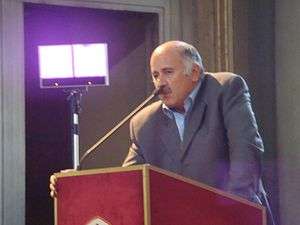Jibril Rajoub

Jibril Rajoub (Arabic: جبريل رجوب, born 1953), also known by his kunya Abu Rami[1] is a Palestinian political and militant figure. He was the head of the Preventive Security Force in the West Bank until being dismissed (along with the force's chief in Gaza, Ghazi Jabali) in 2002.[2][3] He was elected to the Fatah Central Committee at the party's 2009 congress.[4] He also leads the Palestinian Football Association and the Palestine Olympic Committee.[4]
Rajoub was born in the town of Dura, near Hebron. In 1968, he was arrested by Shin Bet at age 15 on suspicion of aiding fleeing Egyptian officers, and spent four months in prison.[1] While in prison, he met a local Fatah leader, who recommended that he be accepted into the organization, which was then secretive. After his release, he joined Fatah. His tasks were to assist fighters and build up cells in the Hebron hills.[1][5]
In September 1970, Rajoub was arrested for throwing a grenade at an Israeli army bus near Hebron. He was tried and convicted of this attack and of membership in an armed group, and sentenced life in prison. He became a prominent figure among prisoners, leading hunger strikes and protests. He also studied Zionism and Hebrew extensively, and together with a cellmate, translated The Revolt by Menachem Begin into Arabic.[5] Rajoub spent time in numerous prisons throughout the West Bank and Israel, as Israeli authorities moved prisoners around to disrupt their organization.[1]
In 1985, Rajoub was one of 1,150 Arab prisoners freed in exchange for three Israeli hostages held by the PFLP.[6] He was soon rearrested for resuming militant activities, and was interrogated and placed in solitary confinement. He was hospitalized after a 30-day hunger strike. After his recovery, he returned to prison, and was released seven months later. In September 1986, he was arrested again for militant activity, and was imprisoned until March 1987[1]
Rajoub continued to work with Fatah cells in the West Bank. He was arrested for his activities during the First Intifada in December 1987, and was deported to Lebanon in January 1988.[1][2] He relocated to Tunis, Tunisia, where as an advisor on the intifada to Fatah deputy leader Khalil al-Wazir. After Wazir's assassination by Israeli commandos, he became a close lieutenant of Arafat, and was allegedly behind a 1992 plot to assassinate Ariel Sharon.[7]
In 1994, Rajoub was allowed to return to the West Bank following the signing of the Oslo Accords. He served as head of the Preventive Security Force until 2002, and Yasser Arafat appointed him as his national security advisor in 2003. During his tenure, he was accused of using the force to quash political dissent and harass political opponents of Yasser Arafat and the Palestinian National Authority, including the use of torture.[8] During the Oslo years, he criticized the growing influence of religious fundamentalism in Palestinian society schools, launched a major crackdown on Hamas and the Islamic Jihad Movement.[7] Local rumours maintain that in 1996 he personally took Hamas members into the hills of Beitunia and shot them personally..[9]
In an interview which aired on Palestinian Authority TV on September 23, 2011, (as a response to a recent speech by US President Barack Obama speech at the UN regarding Palestinian independence)(as translated by MEMRI), Rajoub sharply criticized Obama, stating that "Obama's speech was idiotic. It did not even reflect the US policy or the doctrine they employed in the past. It sounded like a speech of a student leader in a university, rather than the speech of a leader of a superpower."[10]
In June 2012, as head of the Palestine Olympic Committee, Rajoub called a request for a minute of silence to remember the 11 Israeli athletes murdered at the Munich Olympics by Palestinian militants in 1972 "racist".[11]
Rajoub told Hezbollah-affiliated television network Al Mayadeen "until now we have not had nuclear weapons," he declared, "but in the name of Allah, if we had nuclear weapons, we'd be using them."[12]
References
- 1 2 3 4 5 6 Issacharoff, Avi (2009-09-24): "Ex-Fatah strongman: Israel won't live securely until occupation ends", Haaretz
- 1 2 Kafal, Tarik (25 March 2002). "Profile: Jibril Rajoub". BBC News. Retrieved 10 March 2010.
- ↑ Fisher, Ian (5 July 2002). "Days Past Arafat's Order, Two Security Chiefs Resign". New York Times. Retrieved 10 March 2010.
- 1 2 "Fatah: New leaders declare 'revolution'". Agence France-Presse. 11 August 2009. Retrieved 10 March 2010.
- 1 2 Goldberg, Jeffrey (14 September 1997). "From Peace Process To Police Process". The New York Times.
- ↑ http://www.israelnationalnews.com/News/News.aspx/149492
- 1 2 http://web.archive.org/web/20091028092134/http://www.geocities.com/lawrenceofcyberia/palbios/pa06000.html
- ↑ "Profile: Jibril Rajoub". BBC News. 25 March 2002.
- ↑ Nahum Barnea, 'Beitunian nights: The IDF in the West Bank,' Ynet 18 March 2016.
- ↑ Fatah Central Committee Member Jibril Rajoub: Obama's UN Speech Idiotic, "Sounded Like the Speech of a Student Leader", MEMRI, Clip No. 3129 (transcript), September 23, 2011. (video clip available here).
- ↑ Terrorist Chief of Palestinian Olympic Committee Calls Minute of Silence Requests 'Racism' by Yori Yanover, Jewish Press, July 26th, 2012.
- ↑ YNet Rajoub Israel should beware, we are enemies
External links
| Wikiquote has quotations related to: Jibril Rajoub |
- Interview with Al-Jazeera
- For Palestinians, More Than Just A Soccer Game Interview with the New York Times
- Jibril Rajoub – Biography and Reaction to One Minute of Silence, The Jewish Press